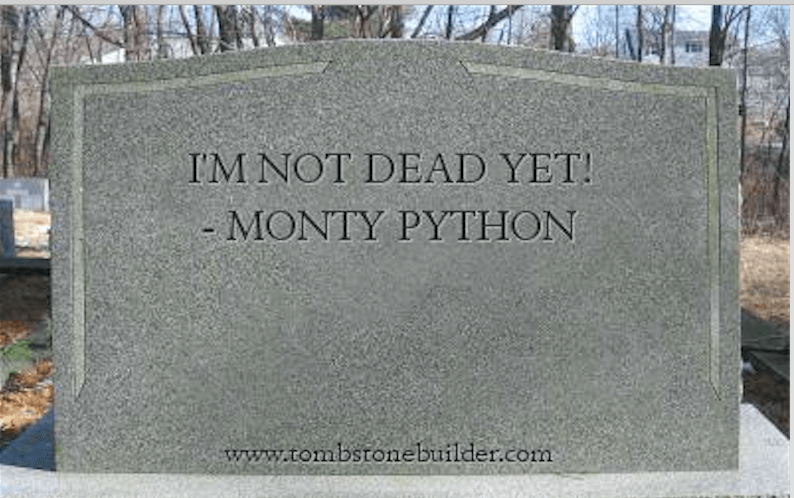Earlier this week, I recorded the inaugural episode of For Immediate Release with Shel Holtz (sans Neville Hobson…sad face) and Frank Eliason (who, BTW, is ridiculously smart and I kind of have a brain crush on him now).
During our more than hour long conversation (!!!) we got to the topic of producing content for executives so they can be seen as thought leaders.
We had a bit of a debate about it because it’s true you can’t be a thought leader without actually doing the thinking, but at the same time, most executives should not spend their time producing content, even if they have a unique position on something in the industry.
My position on it is that you can do many things to help an executive produce the types of content that will help them build their reputation within an industry: Record their town hall presentations, interview them, shadow them, go to meetings with them. And involve them in approvals and getting their voice right. But not in creating, publishing, and distributing it.
You can listen to the episode to hear Frank’s take on it, and it’s a really good discussion to have.
And…it leads me to today’s topic.
The PR Industry is Dead to Me
Earlier this month, Grant Cardone, an “international sales expert,” wrote a piece for Entrepreneur titled, The PR Industry is Dead to Me.
He tells the story of how he worked with five different PR firms for a year to get the kinds of media relations results he was expecting while he “used technology that’s free and available to everyone.”
He said:
I pumped them with massive amounts of relevant content and I could already see the bewildered and overwhelmed look on their faces. Within two weeks they had already given up on the weekly updates and started giving me the standard excuses such as “we pitched them yesterday, it would be offensive to call them again today.”
I’m not going to pretend I haven’t heard this same story over and over and over again from prospective clients who are reticent to hire yet another PR firm. It makes my head and my heart hurt, both for our competitors and for our industry.
And yes, you absolutely can do your own PR. It’s not rocket science. It’s not anywhere close to being difficult to do.
BUT.
Does that mean you should?
Do Your Own PR
He outlines four steps to do your own PR and he’s absolutely right (albeit very stereotypical hard sales-y).
They include:
- Take charge of your own PR. While this isn’t really a how-to step, he does say, “I am constantly posting videos on YouTube, beating up Twitter like a bully, and banging on every other social platform available to me.”
- Make a list of every communication line you can push content on. He talks here about creating content on YouTube, Meerkat, Twitter, Periscope, and Facebook.
- Make a list of what you can push on those lines. “You must become the PR machine, create the story, the news and the excitement, and then disseminate your story on every vehicle possible to tell the world.”
- Create content daily to push down each line to the public. “To become massive I create my own media ploys by watching the news and jumping on hot stories.”
Yes to all four of these and yes if you have a client or an executive who does create the level of content that he describes above and yes if that person also isn’t afraid to use content to tell their story and not use the “that’s proprietary” or “we don’t want our competitors to know what we’re doing” lines.
BUT.
Integrate a PESO Model Every Time
I moderated a panel for Cision last week (more on that later) and one of the questions asked of the journalists was, “Do you prefer to work with a PR person or the expert themselves?”
It was a resounding “PR professional” answer from all of them.
Now, that’s only a focus group of three and I realize everyone will have a different opinion, but the general consensus was a PR professional knows how to interact with journalists and an expert (an executive, client, subject matter expert, or spokesperson) will try to push everything they think is newsworthy down their throats and waste their time.
In other words, the expert will “beat Twitter up like a bully,” which means the journalist will get the beating, too.
Today, as a PR professional, if you are focused solely on media relations, you will have unhappy clients like Grant Cardone.
You should take a PESO model approach every time and also create content, publish it, distribute it, use social media to talk to customers and distractors, create paid media campaigns, do email marketing and lead generation, build an organization’s search engine optimization, interact directly with customers and detractors, build the reputation, work through issues and crises, and even help build thought leadership and authority.
You cannot ignore the hurried need for media relations results and that most executives want to feel like they are all over the place at once.
It can be done, it’s not rocket science, and it works when you integrate all four of the media types.
